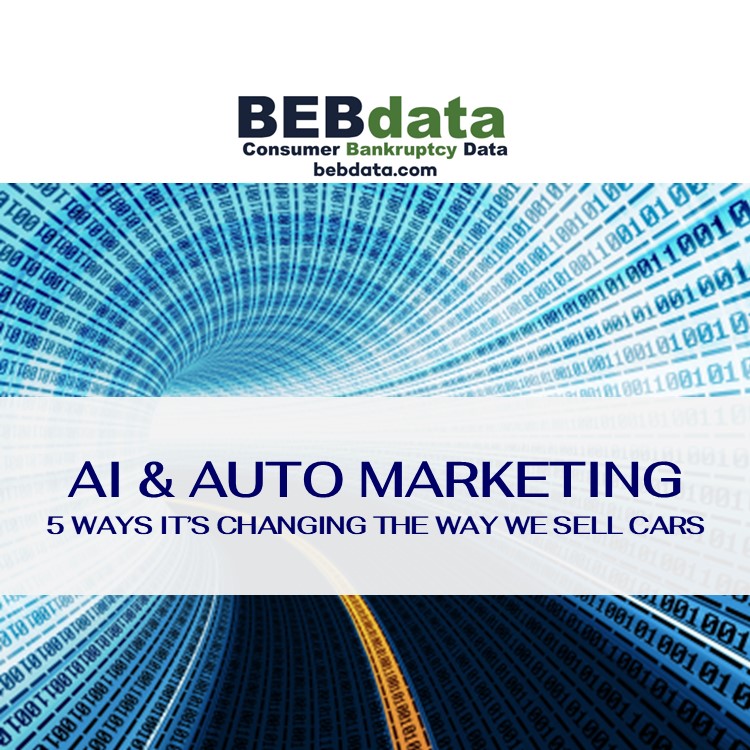
As AI continues to evolve, we can expect further advancements that will shape the future of auto sales and marketing. It’s an exciting time to be part of the industry, and the journey has just begun. By embracing the power of AI, professionals in this field can drive innovation, forge stronger customer connections, and lead the way in an ever-changing marketplace.
Author Archives: BEBdata
AI & CAR SALES PART 4 OF 5

Customer Behavior Forecasting
Indeed, understanding customer behavior has always been crucial in the business world. However, with the advancements in AI, businesses, including those in the auto industry, now have access to powerful tools that take this understanding to new heights. By leveraging vast amounts of data and utilizing sophisticated algorithms, AI enables insightful analysis of customer motivations, desires, and even predicts their future actions.
The ability to forecast customer behavior has proven to be invaluable for dealerships in adapting their sales strategies and products. With AI-driven insights, businesses can stay ahead of consumer trends, ensuring they offer the right products and services that align with customer preferences and expectations.
By integrating AI into their operations, companies can make more informed decisions, optimize their marketing campaigns, and even personalize their customer experiences. The auto industry, in particular, can benefit greatly from these AI-driven insights, as it allows for the development of innovative and responsive strategies that cater to the changing demands and preferences of consumers.
AI’s role in understanding customer behavior is truly transformative, empowering businesses to not only analyze historical data but also anticipate future trends. As technology continues to advance, we can expect AI to play an even more significant role in refining sales strategies and products across various industries, including the auto sector.
AI & CAR SALES PART 3 OF 5

With the help of AI, dealerships can analyze customer preferences, behaviors, and online interactions to create messages that truly resonate with each customer’s unique interests and needs. This could involve offering special discounts on a preferred car model or suggesting related accessories that complement their purchase. By using personalized marketing, dealerships are fostering a deeper connection with their customers, resulting in happier buyers and more successful marketing efforts. If you want to learn more about how AI is revolutionizing personalized marketing.
AI & CAR SALES PART 2 OF 5
Your dealership probably possesses an abundance of data. If your sales, marketing, service, and F&I departments utilize a Customer Data Platform (CDP), it’s likely that you find yourself immersed in a vast amount of data.
The implementation of predictive analytics has revolutionized sales and marketing strategies. Through analyzing historical data and identifying patterns, AI algorithms are capable of predicting future sales, optimizing inventory levels, and even forecasting which customers and demographics are most likely to purchase a particular vehicle.
This predictive capability empowers dealers and Original Equipment Manufacturers (OEMs) to make well-informed decisions, reduce costs, and customize their approach to cater to specific customer segments.
AI & CAR SALES PART 1 OF 5
The auto industry has always been at the forefront of adopting cutting-edge technology, and now, artificial intelligence (AI) is revolutionizing the sector even further. By integrating AI into auto sales and marketing, dealerships and manufacturers are discovering new ways to engage customers and drive growth.
One impactful way AI is changing the game is through the use of chatbots. In today’s world, where instant communication is highly valued, chatbots provide real-time support to potential buyers. While there may be concerns about relying solely on AI language models like ChatGPT, with the right algorithm and data, these conversational agents can answer inquiries, provide product information, and even guide customers through the purchasing process with just a click of a button.
Many dealerships are already reaping the benefits of AI. According to a survey by CDK Global, 76% of dealers believe that AI has had a positive impact on their business. The chatbots available today are no longer limited to simple Q&A; they offer interactive and personalized experiences, becoming an essential tool for auto dealers to engage with prospects 24/7.
There is evidence to support the effectiveness of chatbots. IBM’s Watson Assistant site mentions that personalized retail experiences make consumers 40% more likely to spend more than they originally planned. Personalization always yields positive results.
Marketing With Consumer Bankruptcy Data
 In an era of data-driven marketing, leveraging consumer bankruptcy data can give businesses a competitive advantage. By understanding consumer behavior, identifying targeted segments, and creating personalized offerings, companies can enhance their marketing campaigns and achieve higher conversion rates. Moreover, utilizing bankruptcy data helps businesses mitigate risk, engage customers on a deeper level, and continually improve their strategies. Embracing this valuable resource can unlock new opportunities and ensure long-term success in an ever-changing marketplace.
In an era of data-driven marketing, leveraging consumer bankruptcy data can give businesses a competitive advantage. By understanding consumer behavior, identifying targeted segments, and creating personalized offerings, companies can enhance their marketing campaigns and achieve higher conversion rates. Moreover, utilizing bankruptcy data helps businesses mitigate risk, engage customers on a deeper level, and continually improve their strategies. Embracing this valuable resource can unlock new opportunities and ensure long-term success in an ever-changing marketplace.
Is There A Credit Crisis on the Horizon?
 It’s interesting to see the resilience of the US economy during the first half of the year, especially considering the expectations of economists who anticipated a recession. The second half of the year however, may present some challenges. Federal Reserve policymakers are indicating their intention to continue implementing interest rate hikes, which might introduce some volatility.
It’s interesting to see the resilience of the US economy during the first half of the year, especially considering the expectations of economists who anticipated a recession. The second half of the year however, may present some challenges. Federal Reserve policymakers are indicating their intention to continue implementing interest rate hikes, which might introduce some volatility.
Although inflation rates are gradually declining, price pressures persist, and the Fed has suggested that benchmark interest rates will remain elevated for a longer period. Banks are likely to continue tightening lending standards in the coming months, making it more challenging and costly for households, to secure funding.
Consumer debt delinquencies have risen across various categories. It’s crucial to consider these trends in the broader context of credit conditions.
Many analysts no longer predict an imminent recession. Growth prospects have slowed, and persistent inflation is eroding purchasing power, particularly for less affluent consumers who are relying on credit card debt. Households are depleting the cash reserves they accumulated during the pandemic, which will have an impact on corporate growth prospects.
Overall, while the economy is not on the brink of a recession, slower growth and economic challenges lie ahead, driven by factors such as inflation, tight lending standards, and rising consumer debt.
INTEREST RATES WEIGH HEAVY ON DEALERS
As Inventory Concerns Begin to Fade, Economic Uncertainty and High Interest Rates Take Center Stage for U.S. Automobile Dealers
Latest Cox Automotive Dealer Sentiment Index shows inflation, interest rates, and the economy continue to weigh on dealers and hold back their business.
Read more here…https://www.coxautoinc.com/news/q2-2023-cadsi/
BEBdata at NADA 2024
CAR SALES AND INTEREST RATES
It’s true that interest rates have been a challenge in the auto market lately. With rates steadily increasing and loans becoming more difficult to obtain, car buyers have faced obstacles in financing their purchases. On average, term lengths for car loans have been reaching 72 months, while rates for new and used cars are around 7% and 10.5% respectively.
Despite these challenges, auto sales have been surprisingly robust, which is encouraging. It seems that even with higher rates, customers have been finding ways to make their purchases work. It’s worth noting that the Federal Reserve has indicated a possible shift in their approach to rising costs. They may pause or even reverse their series of rate hikes, which could stabilize rates in the latter half of this year and potentially lead to a decrease in 2024.



